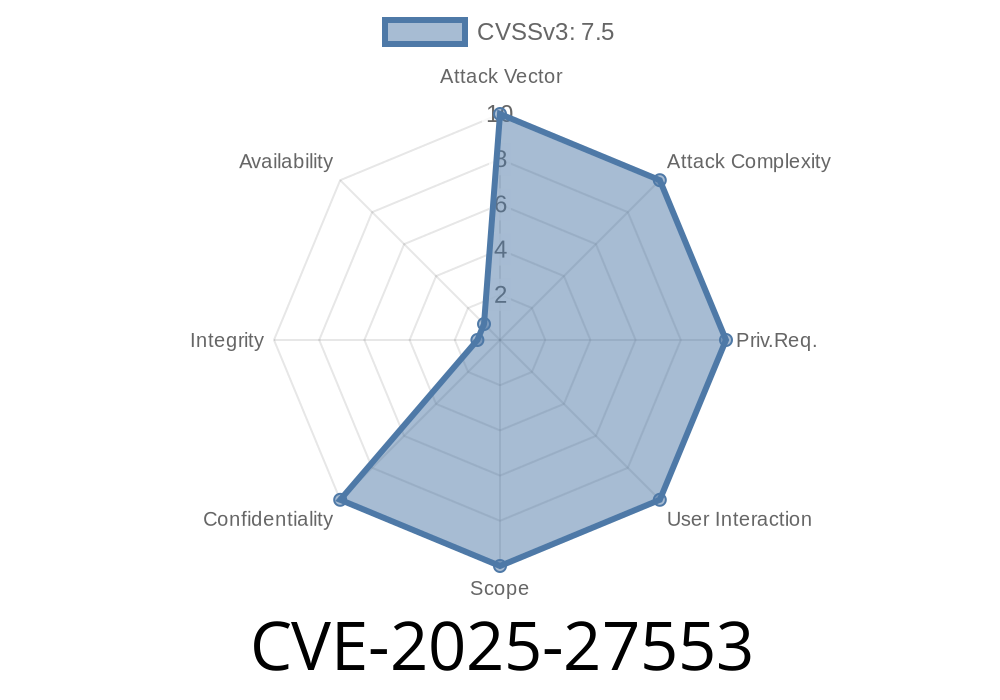Apache Commons VFS is a popular Java library that provides a single API for accessing various different file systems, such as local files, FTP, SFTP, HTTP, and more. It's widely used in enterprise software and applications that require file management across different storage systems. Recently, a critical security bug, CVE-2025-27553, was discovered in versions prior to 2.10.. This vulnerability allows an attacker to perform a relative path traversal attack, bypassing important security checks.
This article gives a simplified but exclusive explanation of CVE-2025-27553, complete with code snippets, links to the original advisory, and details about exploiting this security hole.
What is CVE-2025-27553?
In Commons VFS, the FileObject interface has a method called resolveFile, which is used to resolve a relative filename against another file.
The method takes a scope parameter, and the NameScope.DESCENDENT option promises that
> "An exception is thrown if the resolved file is not a descendant of the base file"
> — Official API documentation
However, if the given path uses encoded characters for ".." (like %2E%2E), the library would not correctly detect path traversal. This means an attacker can access files above the intended directory, which is a severe security risk.
How Does the Vulnerability Happen?
For example, let's say your application uses resolveFile with NameScope.DESCENDENT to make sure users can't escape a specific directory.
import org.apache.commons.vfs2.*;
FileObject base = fsManager.resolveFile("/home/myapp/data");
FileObject file = base.resolveFile("%2E%2E/secret.txt", NameScope.DESCENDENT); // %2E%2E is ".." in percent-encoding
System.out.println(file.getURL());
You would *expect* this code to throw an exception, since secret.txt is outside /home/myapp/data. But with a path like %2E%2E/secret.txt, the old code lets it through. Attackers can access sensitive files, and your security check is bypassed.
Vulnerable Code
// Assume userInput is a string like "foo.txt" or comes from a form/URL parameter
String userInput = request.getParameter("file");
FileObject base = fsManager.resolveFile("/var/www/uploads");
FileObject target = base.resolveFile(userInput, NameScope.DESCENDENT);
InputStream in = target.getContent().getInputStream();
// Read and process 'in'
Attack
If an attacker sets userInput=%2E%2E/../etc/shadow, the code would let them read /etc/shadow (on UNIX systems), leaking sensitive password data.
Official References
- Apache Vulnerability Advisory
- GitHub Patch Diff
- CVE Record at MITRE
How Was It Fixed?
In version 2.10., Apache fixed this issue by making sure that encoded sequences like %2E%2E are properly decoded before checking for directory traversal, making the NameScope.DESCENDENT check robust against such tricks.
If you use Commons VFS below 2.10., upgrade immediately!
1. Upgrade
<dependency>
<groupId>org.apache.commons</groupId>
<artifactId>commons-vfs2</artifactId>
<version>2.10.</version>
</dependency>
2. Sanitize User Input
Never let user input reach resolveFile without validation. Avoid accepting raw paths from users.
3. Audit for Exploited Paths
Check your logs for access to unusual, percent-encoded path names like %2e%2e.
Conclusion
CVE-2025-27553 is a powerful reminder that even popular, trusted libraries can have subtle, dangerous bugs. If your Java projects use Commons VFS before 2.10., you are at risk of path traversal exploits, even if you use built-in protections like NameScope.DESCENDENT. Always stay updated, and test your code for hidden edge cases.
References
- Apache Commons VFS Home
- GitHub Security Advisory (replace with correct link as available)
- NIST NVD Entry
Timeline
Published on: 03/23/2025 15:15:13 UTC
Last modified on: 04/02/2025 22:15:19 UTC
